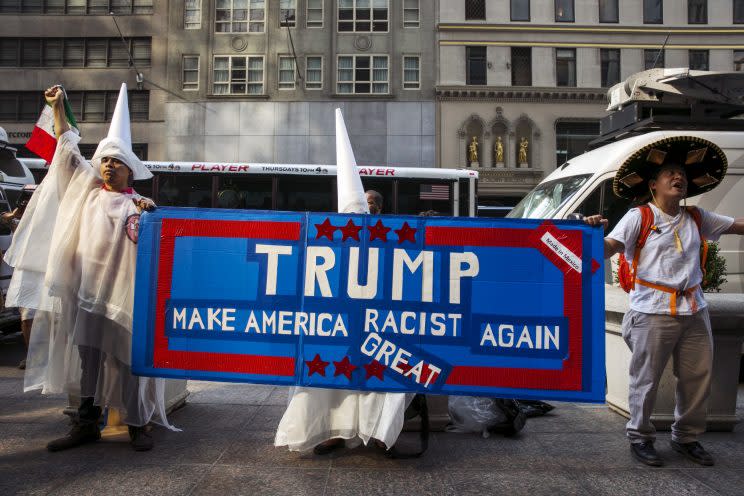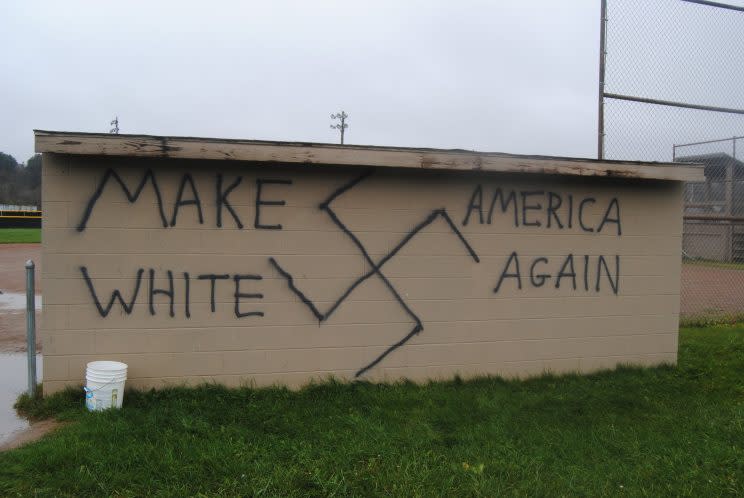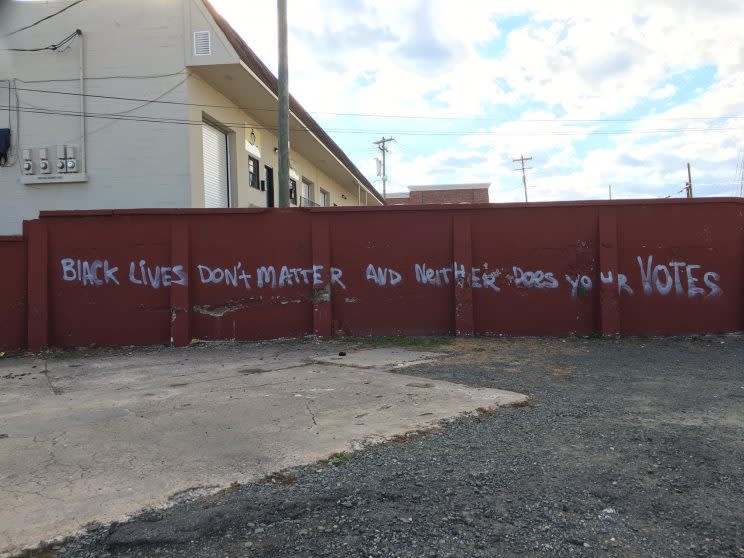Hate incidents spreading in wake of Trump win

On Friday, a Muslim-American high school teacher in central Georgia received a handwritten letter regarding her hijab.
“Your headscarf isn’t allowed anymore,” read the anonymous note. “Why don’t you tie it around your neck and hang yourself with it.”
On Saturday night, a church offering Spanish-language services in Silver Spring, Md., was vandalized with the message, “Trump nation. Whites only.”
And over the weekend, several college students at the New School in New York City awoke to find swastikas scrawled on their dorm-room doors.
These are just a few of the incidents of hate speech, harassment and intimidation that have been reported in the wake of last week’s presidential election. As of Friday evening, the Southern Poverty Law Center, a non-profit civil rights organization that tracks extremist groups, had counted 201 hate incidents in the first three days after the election, citing local news stories, social media posts and submissions through the SPLC’s website. By Monday, that number had more than doubled, to 437.
“We feel strongly that this outburst of hate crimes is directly related to Donald Trump’s victory,”Mark Potok, SPLC senior fellow, told Yahoo News, noting that “a very large proportion” of these cases included direct references to Donald Trump, his campaign or the presidential election. Though the SPLC says that it “did follow up with a majority of user submissions in an effort to confirm reports,” the non-profit is also careful to note that “these incidents, aside from news reports, are largely anecdotal.”

According to the SPLC, immigrants have been the object of most post-election hate reports, followed by African-Americans and LGBT persons. The group also counted 41 “pro-Trump” incidents of intimidation and vandalism targeting no one person or group in particular — such as the sign promoting unity in Connecticut that was spray-painted with the words “Trump 2016” — as well as 20 reported cases of anti-Trump harassment.
“My feeling is that Trump absolutely encouraged this,” Potok said, referring to the divisive rhetoric — including the claim that most Mexican immigrants are “rapists” and “criminals,” his promise to “build a wall” on the United States’ southern border and a proposed ban on allowing Muslims to enter the the country — that came to define Trump’s White House campaign.
“The man has spent the better part of 18 months attacking minorities of all kinds, so it should hardly be a surprise that people who despise minorities are now celebrating and acting out,” he said.
In fact, the recent outpouring of animosity seems to fall in line with what the SPLC and other anti-discrimination groups have described as a rising tide of hate over the past year or so leading up to the election.
On Monday, the FBI released its annual report on hate crimes, which showed an overall rise in the number of incidents nationwide during 2015, driven in large part by a 67 percent increase in anti-Muslim attacks since 2014.
While these can be attributed to a number of factors, including the spate of high-profile terrorist attacks either orchestrated or inspired by ISIS at home and abroad over the past year, Potok said he has “no doubt at all that the Trump campaign contributed hugely to [increased] anti-Muslim” sentiment in the country.
At a post-election news conference last week, several Muslim and interfaith leaders urged Muslim Americans to exercise caution, and called on Trump to offer assurances, particularly to the communities that may have felt threatened by his campaign rhetoric, that as president he will serve and protect all Americans.
During an interview with “60 Minutes” on Sunday, Trump stated that, while he thinks the concerns expressed by minority groups are “built up by the press,” Americans should not “be afraid” of a Trump presidency.

The president-elect also said that he was “surprised” and “saddened” to hear about the reports of post-election hate crimes, intimidation, and threats, and urged his supporters who may be engaging in such behavior to “stop it.”
“It’s all very well for Trump to disavow violence and say stop the hate, but the fact is, he’s been feeding this beast for a year and a half,” said Potok, calling Trump’s directive “a day late, a dollar short and completely disingenuous.”
Like the rash of racist attacks that followed the election of Barack Obama in 2008 and, more recently, the “wave of hate crimes and hate incidents [that] washed over the U.K.” after this summer’s Brexit vote to leave the European Union, Potok said he predicts the current swell in post-election incidents will “peter out over the course of a couple of weeks.”
Still, he said, the license Trump’s campaign rhetoric appears to have given some of his supporters to attack minorities is “incredibly concerning,” especially as he proceeds toward the White House.
The president-elect has already outraged anti-discrimination groups with his selection of former Breitbart News chairman Stephen Bannon, CEO of the Trump campaign, as chief strategist to the Trump White House. Several advocacy organizations, including the SPLC, have launched petitions urging Trump to dump Bannon, who is credited with transforming the conservative Breitbart News site into the mouthpiece of the white nationalist “alt-right” movement.
“The fear is that if Donald Trump does not move away from these extremists, that the violence and political situation will become even worse,” said Potok.




